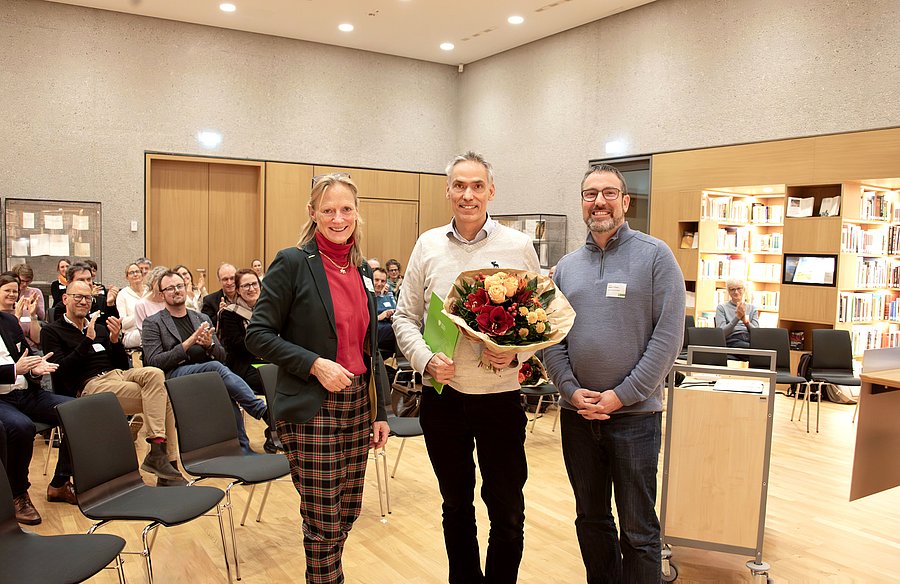Distinction
Prof Ullrich Pfeiffer is the BUW's first Senior Fellow

University Rector Prof Dr Birgitta Wolff (left) and Vice-Rector Prof Dr Stefan Kirsch (right) congratulated Prof Dr Ullrich Pfeiffer on his Senior Fellowship at the BUW. // Photo Friederike von Heyden
"The University of Wuppertal actively supports innovative science. The Senior Fellowship is an instrument of appreciation and targeted support for our outstanding researchers. Here we make bold, yet potentially highly rewarding research ideas possible, which otherwise simply could not be started. The promotion of established expertise contributes to the visibility and attractiveness of Wuppertal as a location and is an important pillar in our strategic portfolio," emphasises Prof. Dr Stefan Kirsch, Vice-Rector for Research and Digital Affairs.
Ullrich Pfeiffer has now been selected as the first Senior Fellow. He holds the Chair of High-Frequency and Communication Technology at the University of Wuppertal. Among other things, his work is dedicated to researching terahertz technology, which plays an important role in the future of communication, specifically 6G wireless communication. Unlike X-rays, terahertz radiation is harmless to humans, which makes it particularly interesting.
With the funding of 500,000 euros that he is receiving as part of the BUW Senior Fellowship, Prof Pfeiffer plans to process information using waves or flashes of light in the terahertz range rather than electric current. "Tiny terahertz chips," he reported at the research network meeting, "could think at the speed of light - faster than any conventional computer processor."
Visible successes
In 2021, Prof Pfeiffer was awarded the prestigious ERC Advanced Grant by the European Research Council (ERC). The highly endowed funding line is aimed at recognised top researchers who want to open up new areas of research. Ullrich Pfeiffer's ERC project "DIRECTS - Computer-aided algorithms for high-performance three-dimensional terahertz light fields" aims to better utilise the potential of terahertz radiation in the creation of 3D images in order to be able to see through opaque objects. Fields of application include material characterisation, the detection of hidden explosives or drugs and medical imaging devices.
The fact that terahertz technology and sensor technology has developed into a visible strength of the University of Wuppertal in recent years is also documented by the successful acquisition of third-party funding and the expansion of the infrastructure: Under the leadership of Prof. Pfeiffer and financed by the German Research Foundation (DFG), a so-called equipment centre was set up at the University of Wuppertal to research the new 6G mobile communications standard. Here, researchers from Wuppertal and their regional and international cooperation partners have access to specialised equipment in the field of terahertz measurement technology.
More background on the BUW Senior Fellowship
The BUW Senior Fellowship is open to professors with a proven track record of excellence in their field of research who have been working at the BUW for at least ten years and have made a national and international impact in their field. The focus of the funding is on projects with a clear reorientation or expansion of their own research portfolio and the potential to have a particular impact on the BUW.
Applications for the current funding round can be submitted until 31 August 2026. Further information can be found on the research funding website.
Prof Dr Ullrich Pfeiffer holds the Chair of High-Frequency and Communication Technology at the University of Wuppertal. His research paves the way for new applications in communication, imaging and sensor technology. Pfeiffer previously worked at IBM Research (USA), received an ERC Advanced Grant from the European Research Council and was honoured as a Fellow by the IEEE, the world's largest professional association for engineers.
He leads several large-scale research projects funded by the German Research Foundation (DFG), is coordinator of the INTEREST priority programme (SPP 2314) and is shaping the development of future 6G and terahertz technologies in Europe with his work. He is also intensively involved in the training and promotion of young scientists.
